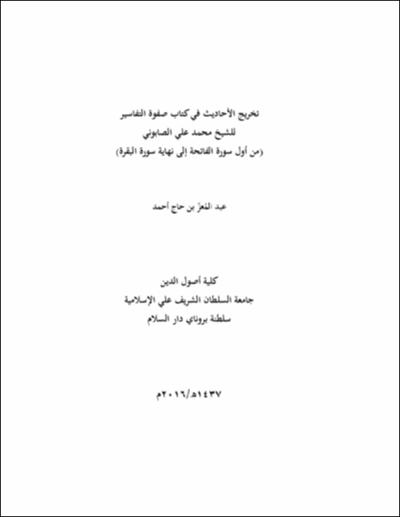| dc.description.abstract | This dissertation aims to investigate the prophetic traditions in the book Sofwah At-Tafasir by Shaykh Ali As-Sobuni from the beginning of the chapter Al-Fatihah until the end of the chapter Al-Baqarah. The importance of this research is that it investigates the Prophetic narrations from one of the famous books on tafseer (exegesis) called Sofwah At-Tafasir, where the importance of examining hadith clearly cannot be hidden from anyone because it can protect the sunnah form fault. Therefore, the purpose of this thesis is to expound the character of Shaykh Ali As-Sobuni, the methodology adopted in his book, and the rulings of the prophetic narrations within it .
The dissertation relies on two research approaches: the inductive approach and the critical approach of which both are manifested by examining those narrations, tracking it to its original sources, and then quoting the rulings of said narrations by the scholars of its science. Lastly, I concluded the study by stating its foundings, which are as follows: Indeed, Shaykh Ali As-Sobuni ia one the contemporary scholars of tafseer and he was greatly involved in the teaching, educating and authoring of various works in various discipline especially on tafseer. For Sofwah At-Tafasir, it was a book chosen by the Shaykh because it has the most correct and preferred opinion amongst other books on tafseer and it compiled among the ma’thur and the ma’qul with a simple and clear style, paying attenting to the forms of rhetoric and language. the prophetic narrations mentioned by Shaykh As-Sobuni in his book Sofwah At-Tafasir from the beginning of the chapter Al-Fatihah until the end of the chapter Al-Baqarah are seventy two in total, from which forty two are genuine (Sahih), four are genuine due to external factors (Sahih lighairihi), one are good (Hasan), and ten are good due to external factors (Hasan lighairihi), nine are weak (Dha’if), four are extremely week (Shadidah ad-da’f) and two of which the reasearcher was unable to track therefore could not ascertain the rulings of scholars regarding it. | en_US |



